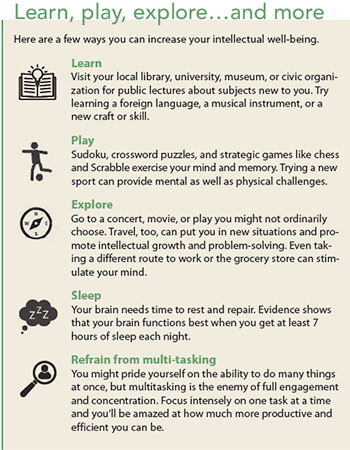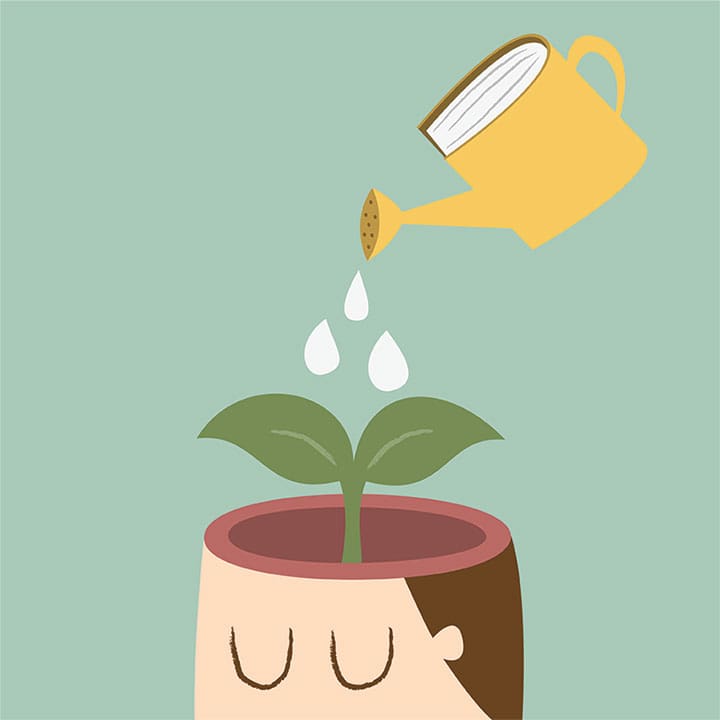Learn how to keep your mind nimble for lifelong health benefits.
Takeaways:
- Intellectual well-being—keeping your mind flexible, informed, and engaged—is as important as physical health.
- More than just a concept, intellectual wellness actually improves the physical structure of your brain.
This is the fifth installment in a series of articles on wellness. You can read the earlier articles at americannursetoday.com.
As a nurse, you probably already do many things that boost your intellectual wellness. You might work with new patients every day, learn about new procedures and protocols, and be asked to handle different responsibilities or work a different shift with little time to adjust. And although you may sometimes find all this change frustrating, adaptation is actually good for your mind. When your muscles are challenged, they grow and strengthen; the same is true for your brain. In fact, when it comes to optimal well-being, activities that strengthen our minds are just as important as those that strengthen our muscles.
At The Ohio State University, we have a unique free wellness program, Buckeyes Band Together for Wellness, with a learning module for each of the nine dimensions of wellness. Lindsay Bernhagen, PhD, who created the intellectual wellness learning module, defines it this way: “The intellectually well person values lifelong learning and seeks to foster critical thinking, develop moral reasoning, expand worldviews, and engage in education for the pursuit of knowledge.” Just as a flexible body indicates physical health, she says, a flexible mind connotes intellectual health. When you learn a new skill or concept, attempt to understand a different viewpoint, or exercise your mind with puzzles and games, you’re building intellectual well-being.
Give your brain a boost
Studies show that physical and mental exercise support the growth of new neurons, while stress and depression can hinder it. Challenging your brain also helps existing neurons form new connections. Combining intellectual growth and relaxing mindfulness can boost your brain’s health and prevent mental decline as you age.
 With the amount of data you have to keep track of and the many important, brain-taxing decisions you have to make, you may think you can’t take on more mental work. Think of it as giving your brain a treat instead. Engage in some mental play. Find fun (and free) opportunities—such as reading, mindfulness, and breaking up your routine—to improve your intellectual wellness. (See Learn, play, explore…and more.)
With the amount of data you have to keep track of and the many important, brain-taxing decisions you have to make, you may think you can’t take on more mental work. Think of it as giving your brain a treat instead. Engage in some mental play. Find fun (and free) opportunities—such as reading, mindfulness, and breaking up your routine—to improve your intellectual wellness. (See Learn, play, explore…and more.)
Read
Spend 10 minutes at the start of each day reading a book about positive thinking. This exercise will be good for your brain health, elevate your mood, and protect you from negativity. Spend another 10 minutes each day either reading the news to stay informed about the world or a nonfiction book to learn about a new subject. Ask a friend to recommend a book you wouldn’t ordinarily choose; for example, if you’re not a science fiction reader, maybe give Ursula Le Guin’s books a try. Read about a political issue and then debate the topic with a friend, taking the opposite of your own point of view. Reading for fun increases your ability to visualize and helps build new neural connections.
Practice mindfulness
Mindfulness focuses your awareness on the present moment. One way to do this is to focus on your breathing; concentrate on the air moving in and out. Acknowledge thoughts as they arise and then let them go without exploring anxieties about the future or regrets about the past. A few minutes of mindfulness practice a day allows your brain to relax, destress, and recharge. A good (and easy-to-read) book about mindfulness is The Presentby Spencer Johnson, MD. Meditation and yoga are other ways to immerse yourself in mindfulness. Relax and recharge your brain daily with a little quiet time, even if that means sitting in your car in the driveway when you get home and taking five deep breaths.
Disrupt your routine
Any time you step out of your normal routine, your brain has to work a little harder as it adjusts, processes new information, and finds creative solutions and new stimuli. Try driving home using a different route, eating at a new restaurant, or rearranging your furniture. In addition to finding new things to enjoy, stepping outside of your comfort zone improves your brain’s neuroplasticity. Engaging in lifelong learning, challenging your mind, and following your curiosity sets the stage for a vibrant, centered, and mentally active life.
Evidence shows that novelty also can boost memory. “If something novel grabs your attention, you’re more likely to remember things that happened right before or after the event,” explains science writer Tianna Hicklin, PhD. We don’t know exactly why this is so, but mice studies suggest that the brain releases dopamine when encountering novel situations, which boosts memory.
What are you excited about?
You can integrate other dimensions of wellness (such as physical, financial, or spiritual) as you add intellectual stimulation into your life. Hiking, biking, or walking through a new park will flood your brain with new sights and sounds and boost your physical health, too. Take a class or read a book about wellness topics you’d like to learn more about, like financial responsibility or spirituality. Or boost your intellectual and social well-being by joining a game-playing group with new friends.
Sometimes learning something new is as easy as asking a friend, coworker, or patient about what they like to do, and what they dream of doing. “What are you excited about doing next?” is a great question to ask someone you’d like to learn more about. Bonus: If you’ve been thinking about new ways to exercise your brain, you’re sure to have an interesting answer when someone asks you that question.
The authors work at The Ohio State University in Columbus. Bernadette Mazurek Melnyk is the vice president for health promotion, university chief wellness officer, dean and professor in the college of nursing, and professor of pediatrics and psychiatry in the college of medicine. She is also a member of the research, data, and metrics working group for the National Academy of Medicine Action Collaborative on Clinician Well-Being and Resilience. Susan Neale is senior writer/editor of marketing and communications in the college of nursing.
Selected references
Barry SR. How to grow new neurons in your brain. Psychology Today. 2011.
Hicklin T. How novelty boosts memory retention. National Institutes of Health. September 20, 2016.
ant5-Wellness-416


















